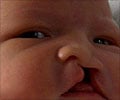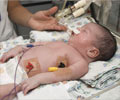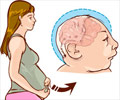According to a study on mice, dietary zinc supplements throughout pregnancy can reduce some alcohol-related birth defects.
While animal studies have shown that exposure to binge drinking while in the womb increases the risk of numerous problems for the foetus, including early postnatal death, a new study suggests that dietary zinc supplements throughout pregnancy can reduce some alcohol-related birth defects.
Scientists at the Hanson Institute in Adelaide came to this conclusion after carrying out experiments on mice."Alcohol's damage to the foetus depends not only on the amount and duration of alcohol exposure, but also on the timing of the exposure relative to the development stage of the cells and tissues involved," said Peter Coyle, associate professor at the Hanson Institute in Adelaide, and corresponding author for the study.
"Earlier work had shown that prenatal alcohol, as well as other toxins, can result in foetal zinc deficiency and teratogenicity by inducing the zinc-binding protein, metallothionein, in the mother's liver. Since then, our group has confirmed the importance of metallothionein in alcohol-mediated birth defects," he added.
During the study, he and colleagues injected pregnant mice with either saline or a 25-percent solution of alcohol on gestational day (GD) eight.
The researcher revealed that all mice received either a regular or zinc-supplemented diet from GD zero to 18.
On GD 18, foetuses from all four groups - saline, saline plus zinc, alcohol, alcohol plus zinc - were assessed for external birth abnormalities.
Advertisement
"There were three key findings. One, foetal abnormalities caused by acute alcohol exposure in early pregnancy can be prevented by dietary zinc supplementation. Two, dietary zinc supplementation throughout pregnancy can protect against post-natal death caused by acute alcohol exposure in early pregnancy. Three, dietary zinc supplementation increases the mother's blood zinc to overwhelm the transient drop in zinc caused by alcohol, which we believe prevents the foetal zinc deficiency and subsequent foetal damage," said Coyle
Advertisement
"This encompasses a period when the mother is often unaware of her pregnancy and may not have changed her drinking habits. Moreover, up to 60 percent of pregnancies are unplanned. This latter point is of concern when noting that binge drinking is common in the community and more likely to occur in the first trimester than later," he said.
Coyle, however, insisted that he was just not suggesting that it was safe to drink while taking zinc during pregnancy.
"We have not determined whether zinc protects against all of the possible negative outcomes from alcohol exposure in pregnancy," he said.
"Nor would we recommend that makers of alcoholic beverages include zinc in their product so that women can drink while pregnant. Indeed, we take the conservative stand of a 'no alcohol policy' during pregnancy. What our studies do indicate is that dietary zinc supplementation could be as important as folic acid and applied as a simple prophylactic treatment in the human setting to prevent the effects of a range of insults in pregnancy," he added.
The researcher even warned that zinc could also affect the absorption of other trace elements and cause anaemia if taken in excess.
"So one must be wary of taking zinc supplements without professional oversight, and this is particularly so in pregnancy," he said.
"Furthermore, although dietary zinc supplementation has been used in human pregnancy, we do not have any information regarding the dose that would be required to protect against damage from alcohol nor even the dosage that could be harmful to foetal development.
Indeed, we have not tested our hypothesis in humans and so it would be unwise to extrapolate any of our findings to humans. We would predict that zinc supplementation would only be effective around the time of alcohol intake to prevent foetal zinc deficiency. Taking zinc supplements a day after alcohol consumption would probably be too late to prevent foetal damage. Obviously more research is needed," he added.
The study will be published in the April issue of Alcoholism: Clinical and Experimental Research, and is currently available at Early View.
Source-ANI
PRI/SK













